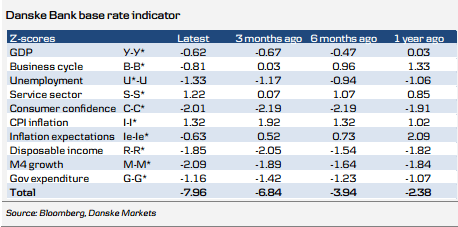Dovish Minutes
The Bank of England Minutes from the 9 February meeting on monetary policy was somewhat more dovish than the market had anticipated. Our expectation was that the decision to increase the asset purchase target by £50bn to £325bn was unanimous, but it turned out that two members of the committee, David Miles and Adam Posen, preferred to increase the programme by £75bn. While the current programme runs over three months, it was not specified how the dissenters wanted to spread out the purchases. The market considered prior to the release that there would be three dissenters – but that these had preferred not to do more QE at all. The result was a complete shift in market sentiment and the interpretation was that the MPC clearly upholds a dovish stance and that more gilt purchases are more likely to be announced when the current programme finishes.
QE programme is likely to be extended in May
Our base rate indicator clearly suggests that more QE will be announced in May. No less than eight out of ten input factors are below trend and five of these are substantially below fair value (defined as more than one standard deviation away from 10-year mean). Especially low consumer confidence, money growth and declining disposable incomes for households are weighing down on the indicator. Only the most recent pick-up in service sector sentiment and still high current inflation suggest some normalisation of rates. The outlook for monetary policy today can be compared to 2009; back then, the BoE ended up buying gilts worth £200bn to combat the economic and financial crisis. To avoid a technical double dip recession, we think the BoE will end up having spent the same amount again when this year is over, i.e. QE totalling £400bn.
Market implication
With more QE coming up Gilts should remain supported. With a changed buying
strategy, there should be more support to shorter-dated gilts compared to longer-dated. An obvious trade is the 5-10Y steepener. Sterling should have little support and EUR/GBP can continue to edge higher if the euro debt crisis does not escalate further.
What are the main reasons for more QE?
In our view, there are several reasons for the BoE to continue with the asset purchases in most of 2012:
- Inflation is coming down rapidly and CPI should fall below BoE’s 2% target in Q4. The Minutes state that “The Committee’s central view was thatinflation would decline further during 2012 as the contributions of energy andimport prices continued to wane and as spare capacity weighed on wages and prices.” In its Inflation Report released last week, the BoE projects CPI to be at1.8% in the medium horizon, i.e. implicitly suggesting that more QE is warranted.
- Economic growth is almost non-existent and output should only expand modestly in 2012. Better than the Eurozone, but far from where the recovery should be given the low starting point. Minutes note that “Headwinds from the weak external environment, tight credit conditions and the fiscal consolidation were, however, likely to continue to depress spending, so that some margin of economic slack was likely to persist.” In theory, the BoE should keep monetary policy very accommodative until the output gap is substantially smaller (or evenclosed).
- The Euro crisis is a concern for the BoE, which fears for UK exports and UK banks. Specifically, the Minutes said that “[PMI’s] pointed only to broadly flat output in the euro area, the United Kingdom’s largest export market” and “The ECB’s LTRO had reduced some of the most immediate risks facing European banks, but concerns remained about the indebtedness andcompetitiveness of some euro-area countries. In part as a consequence of theECB’s actions, conditions in bank funding markets had been better in the first month of 2012 than in the second half of 2011. But UK banks’ funding costs remained higher than in 2010 and the first half of 2011, and these had begun to feed through into further increases in the cost of credit for some borrowers.”.
- The public deficit and the government’s austerity makes it essentially impossible to tighten monetary policy and suggest the BoE should buy giltsworth around £10bn every month just to keep up with net supply and keep rates low. Fiscal tightening crowds out monetary tightening and as long as the budget isn’t balanced – which it will not be before 2015-16 at the earliest, gilt purchases will be required if it is desired to keep interest rates at current levels.
- The BoE would probably have done more QE already if it thought the market could absorb gilt purchases at a faster pace. Even though the MPC could see “a number of reasons” for a smaller than £50bn increase in the asset purchase target, no one actually voted for that. Instead two members voted for a larger amount of asset purchases “given the considerable margin of spare capacity remaining in the economy and the extent of deleveraging still likely to be required ”and noted further that “there was a risk of a prolonged period of depressed demand causing inflation to fall materially below the target in the medium term. In addition, persistently weak growth might impair the future supply capacity of the economy through hysteretic effects: that risk could be attenuated by a more aggressive loosening of monetary policy in the nearterm”.
